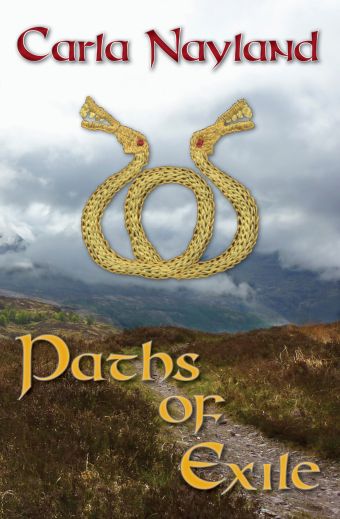Paths of Exile is a wonderful story, one that conjures up this long-gone age in extraordinary detail and reveals a profound understanding of its politics, cultures, and religions based on extensive research. It may be true, as Nayland admits, that “solid facts are rare indeed in 7th-century Britain”, but these characters—some real, others pure fiction—are so solid and credible that they will stay with you long after you turn the last page....
Full review on the Historical Novel Society website
Welcome to Carla Nayland's website.
 Here you can read about my novels Ingeld's
Daughter and Paths of Exile,
find out about the background to
the novels, and contact me with your questions
and comments.
Here you can read about my novels Ingeld's
Daughter and Paths of Exile,
find out about the background to
the novels, and contact me with your questions
and comments.
Paths of Exile is available from Wordery.com, Amazon.co.uk, Amazon.de, Amazon.ca and Amazon.com, and bookshops should also be able to order copies. It is also available from the Book Depository, and as an e-book from Amazon Kindle UK, Amazon Kindle US, and in several e-book formats including Kindle, Epub (Nook, Sony Reader) and Palm from Smashwords. Signed copies (limited stock) available direct from the author, contact me for details.
BBC Radio Suffolk interview about Paths of Exile.
You can also read my non-fiction articles on various aspects of history, lifestyle and culture.
There is also a page of books I like, and a list of my book reviews.
I shall be adding and updating content from time to time, so check back regularly. The most recent additions to the website appear in the What's New panel on this page, and you can also subscribe to our RSS feed.
I also keep a blog, with regular postings about reading, writing and researching historical fiction, plus anything else that interests me.
Carla Nayland writes historical fiction set in Britain in the period between the Roman occupation and the Norman Conquest (5th to 11th centuries AD), and fiction set in an invented world loosely based on medieval and Renaissance Britain. Carla Nayland has a lifelong interest in history and archaeology and considered doing a degree in the subject in her spare time, until deciding it would be much more fun to explore it in historical fiction instead. Historical fiction is more absorbing to write than a research paper, because it requires imagining a past society in all its detail, and requires the author to make choices and follow up the consequences. The result is also rather more enjoyable to read than a thesis.
She has degrees in Natural Sciences and Pharmacology from Cambridge, UK, and has worked for many years in corporate strategy, cost-benefit analysis, health economics and scientific writing. Carla Nayland is also a keen hillwalker, which is a bit of a problem as she lives in the flatlands of East Anglia. She knows the M6 rather well. Carla Nayland is a pen name, to keep her fiction separate from her scientific writing.